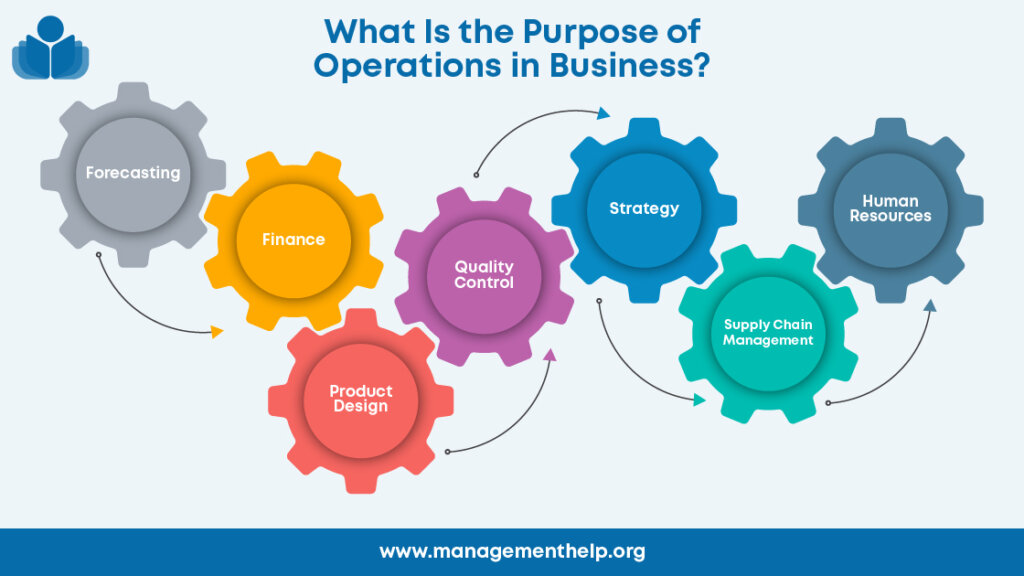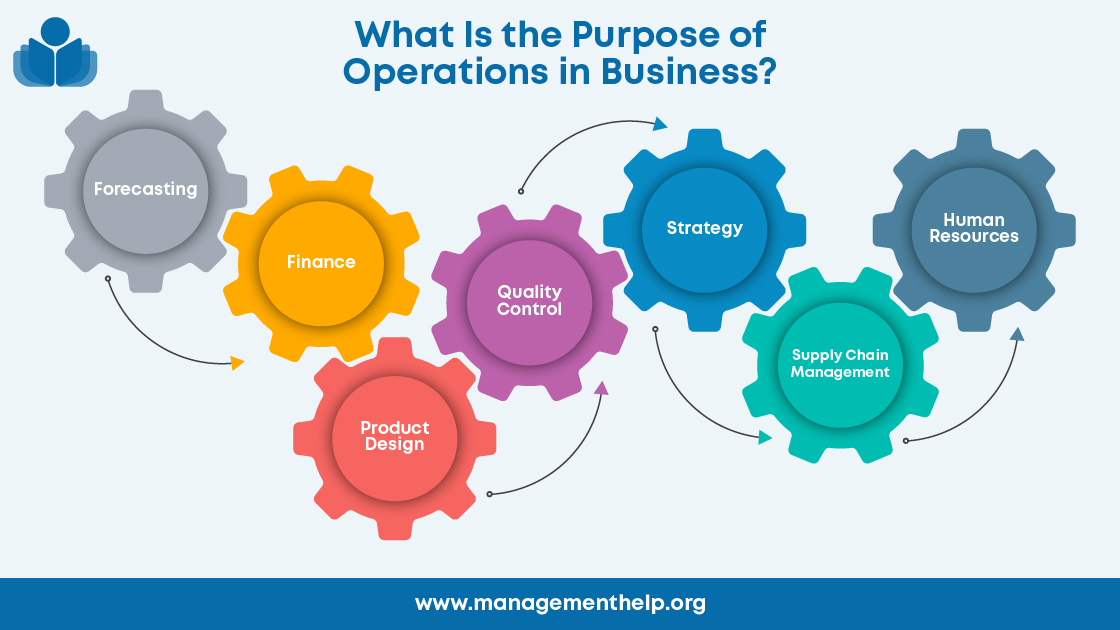Business operations is an elusive but necessary part of any organization looking to maximize productivity and profit potential. Companies that struggle to understand operational demands often miss key opportunities to succeed. This article explains how operations applies to businesses and tips for improving efficiency across the board.
What Are Operations in a Business?

An operations department exists to manage and facilitate the internal components of a business. The individual or team responsible for operations helps ensure a company has everything it needs to run smoothly from within. These requirements can vary drastically from one business to the next, but always tend to contain four things.
The Right People
Making sure your team fills their roles well is imperative for an efficient business operation. The right people will get tasks done faster and be more productive along the way.
An Efficient Process
Building processes goes a long way toward having an efficient business model. These methods give employees a roadmap to follow when performing tasks in the workplace. Having a uniform system keeps everyone on the same page and allows teams to complete challenges with little help from management.
The Ideal Location
Having the right location is vital for accomplishing the goal of your business. Whether you’re making items or rendering a service, your team works best in an environment suited to the task at hand.
Keeping Up With Equipment
Be it computer systems or manufacturing tools, your company works best with the right equipment. These crucial elements can have a substantial impact on how your business runs.
Which Types of Companies Need Operations?
Many types of companies can benefit from operations. Here are some of the most common ones.
Retail
Retail business operations revolve around product availability and managing inventory. An efficient retail business knows the items it has on shelves and in storage at any given time. This allows teams to place products in strategic locations around the store (or website/online store) to make sought-after items easily accessible.
Having a pulse on inventory also reveals products that aren’t selling and what a retail store may want to buy less often in the future. It also helps keep fast-moving products in front of customers that generate the most revenue.
In a similar vein, having operations in retail helps track price points and how much you can charge for particular items. Prices set too high won’t sell, but anything priced too low is a loss of profit potential.
Retail businesses are just as popular online as brick-and-mortar locations, and selling in the right place makes a huge difference as well. A storefront in a busy shopping area with ample room for stock will likely have more success than a remote location off the beaten path. Selling products online also needs the proper outlet, whether an individual site or an online marketplace.
Service
Services businesses depend primarily on customer interaction. Operations teams must consider all the client touchpoints, such as in-person or via an email campaign. Effective companies find ways to make these connections as seamless as possible, involving efficient processes to communicate promotions, expedite interactions, and generate ongoing sales.
In addition, service teams rely on equipment that makes the experience better for both consumers and the organization. Having individuals that know how to use project management tools go a long way while creating an atmosphere the client feels favorable about.
As in retail establishments, operations teams work to find the best location for providing these services. While some services can be rendered online, others require a physical location that draws customers in.
Restaurant
The restaurant industry combines the best (and worst) of both service and retail. Where a clothing store can leave unwanted clothing on a back shelf for an indefinite period of time, food doesn’t last forever.
Operations must have a solid grip on foodstuffs that sell well and those that need to come off the menu. Food prices fluctuate, and operations must keep tabs on the latest costs and what to sell dishes for. It’s also beneficial to implement processes for food storage and preparation so items don’t go to waste.
On the service side, hiring the right people to fill various positions plays a major role in customer satisfaction. Not everyone can cook a filet mignon perfectly medium-well, and approachable wait staff have a better chance of leaving diners with full stomachs and happy hearts.
A restaurant’s location is paramount to success. Heavily trafficked zones bring in more patrons, and ample space means more seating and shorter wait times.
Manufacturing
The concept of operations began out of a desire for more efficient manufacturing processes. Businesses needing parts to assemble finished goods needed stable processes and organized purchasing systems.
In many cases, several parts come together in one location with the goal of building a quality finished product to sell to consumers. Teams need to carefully track each of these components to ensure nothing is missing and costs aren’t out of hand.
A well-established process for assembly spells more output per day and high profits down the road. An inefficient operation leads to mistakes and slower turnaround times. In most cases, manufacturing occurs in large facilities that must be accessible to receiving lanes to prevent part delays.
Small businesses can also fall under this umbrella if they put together a product to sell. The same guidelines help an in-home business succeed, albeit on a smaller scale.
Technology
Technology is a very skill-specific category where hiring the right people can make all the difference. Operations teams must have a deep understanding of job requirements to bring in staff to handle the scope of projects. Having a training process in place helps new employees get started on the right foot while maximizing chances for success.
Using common hardware and software across teams makes collaborative efforts that much easier across the board. For clients, seeing the same faces and results each time only adds to overall satisfaction.
The Role of Business Operations
Business operations is rarely a solitary position, except in the smallest of companies. Consider whether your organization could benefit from plugging people into any of the following roles:
Forecasting
A forecasting team looks forever to the future, predicting pitfalls that may cause the organization to stumble. Hindsight may be 20/20, but catching issues before they happen keeps a business running like a well-oiled machine.
Knowledge of past events and shortcomings with careful documentation can prevent repeat mistakes the next time around. It similarly helps with creating timelines and budget plans while anticipating expenses, profit, and loss.
Finance
A financial operations manager (or team) oversees the flow of money through an organization. This individual ensures spending doesn’t get out of hand while keeping the company supplied with necessary resources.
This role also plays a part in finding ways to generate new funds as needed for a business to grow. It can also limit employee spending and allocate funds to the right buckets.
Product Design
Product designers use their skills to discover customer needs in a specific market. This group then sets out to create goods to meet that need at a price consumers are willing to pay. Even if a product is not new, product designers can innovate existing items to pinpoint what a customer is looking for.
Quality Control
Quality control teams set guidelines in place to catch potential issues during design and manufacturing processes. Products going out the door with defects reflect poorly on a company and can lead to loss of customers and revenue.
Error-checking begins during the design process and sees a project through to completion. Along the way, quality teams periodically check for flaws and misassembled goods. Consistency also builds toward smoother flow and more finished items heading to stores.
Strategy
Operations strategy involves creating and executing plans that help companies grow. Since businesses don’t have an unlimited source of funds, strategy teams work to determine where resources should go to maximize their chances of success. Strategies may also look to improve product costs or find ways to eliminate budget constraints.
Supply Chain Management
Supplies often constitute the lifeblood of a retail or manufacturing company. Without inventory or components, it’s not possible to generate income or sustain a business model.
Those working in supply chain operations keep products flowing into (and out of) a business. They anticipate and work around shortages while predicting how supply and demand will affect costs and availability in the coming months. The group should also be the first to identify items that aren’t profitable and how to move away from them altogether.
Human Resources
Human resources teams are responsible for putting people in the right positions throughout a company. Doing so keeps people happy and productive while adding to the efficiency of the business as a whole. Interested in hiring the right people for the right positions, then check out our 8-step guide on how to interview someone.
What Does a Director of Operations or Chief Operating Officer (COO) Do?
These two roles are usually synonymous and represent an individual in an executive position. The position comes with the responsibility of overseeing daily operations with a wide lens, ensuring all departments work together as efficiently as possible. Typically, operations analysts from these different groups report directly to the COO.
COOs are often the second-highest rank in any organization, just under the CEO. They handle the internal affairs that keep a company running, executing plans and strategies to accomplish this goal. With such a critical role, a director of operations salary ranges around the $180,000 mark.
Ways to Improve Operations in Your Business
Business operations are fluid in nature, as customer demands change over time. Below are a few methods for improving operations, no matter what size your organization may be.
Measure Performance
To understand how to grow as a company, you must first learn where you stand. Measuring performance requires taking careful stock of budgets, plans, timelines, and processes that make your business work. From there, it’s a matter of uncovering what’s not efficient and improving upon it.
Streamline Processes
Without a good operations strategy in place, processes can be clunky and inefficient. With performance metrics in place, you can zero in on areas of improvement and streamline them. Following this information over time reveals what makes systems work well.
Follow the Latest Trends
An operations analyst should stay on the pulse of the market, making note of ways to improve overall efficiency. Trends could come in the form of new laws or an innovation taking the sector by storm.
Customers change their minds often, so staying apprised of social media chatter or new interests can help your business catch a client’s eye. Don’t be afraid to peek at what the competition is doing well that you can glean from.
Invest in Your People
No matter how many employees you have, investing in your people helps build morale and create a more efficient work environment. Team building events allow individuals and cross-platform teams to work together and accomplish common goals, which they can take back to the task at hand. Check-ins with employees and rewards for jobs well-done speak to the operation of the business as a whole.
Try New Software
Adding new management software or changing up existing programs can provide new insights or the means to streamline processes you couldn’t before. With these services, you can have on-hand sales data, project tracking, inventory management, and more. Best of all, you can store all this information in a single online location.
Frequently Asked Questions (FAQs) for Operations in Business
Operations in business is a bit of a gray area that looks different from company to company. These questions address some of the biggest questions surrounding the concept.
Bottom Line on Operations in Business
Operations are crucial for any business looking to thrive in an ever-evolving marketplace. Developing streamlined processes and hiring the right people can catapult your company ahead of the competition. No matter your size, having operations in place can spell the difference between success and failure.

